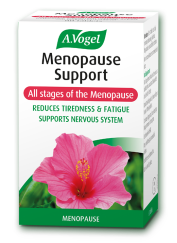Today's topic
Hello, and welcome to my weekly video blog. And today on A.Vogel Talks Menopause, I’ve got a couple of viewers’ questions, which I think are quite interesting ones, and probably affect quite a lot of you actually watching today.
Q1: Bulging tummy
Now the first one is from Saheeba, and she was asking about a bulging tummy. She says, “What causes it, and is there actually anything we can do about it?” Now, there are possibly two main reasons why this can actually happen in the menopause, and it is actually a really, really common problem.
Falling Oestrogen
The first one is, as I’ve explained before in several of the issues, that falling oestrogen can actually affect our carbohydrate metabolism. So it can actually slow our metabolism down, even though we might not be changing our diet, and we may not be having extra calories. We start to put on weight. And very often, the weight actually goes around the tummy area.
Bloating
Now, it could also be caused by bloating, and bloating, again, can be affected because low oestrogen is actually slowing our transit time down. And you might find you get very bloated, you get windy, and it’s this whole thing of you get up in the morning, put your skirt or your trousers on, and everything does up nicely. And then by tea time, you’re thinking “Oh, everything’s so tight, I’ve got to undo my zip or undo my button.” And this is very often an indication of digestive bloating.
Now, there’s a number of things you can do with this. Watch your carbohydrate intake, and things like lots of bread, and pasta, and white rice can really be a major contributor here. So try and cut those down a little bit and see if that helps. You’ve also got the fact that we tend to get a bit sluggish as we get older. So remember to have plenty of really good fiber-rich foods in the diet, and remember the water as well, because that will help to keep everything moved along.
Putting Weight On – Stress
Now the other way we can get a bulging tummy is if we start to actually put on weight that starts from below the bust line and basically gives us what’s called the menopause apple-shaped tummy. Now this tends to be caused because of a reaction to stress. Now I’m sure all of you have heard of the flight or fight. In times gone by, our nervous system would be adapted to any sign of danger, would be adapted to running away, or fighting. And there’d be a very, very quick surge of adrenaline into the system, and we would deal with the stress, and then everything would calm down, and the body would go “Whew! But I need a bit more energy. What if this happens again tomorrow?”
So it actually, that kind of stress scenario makes us very hungry, and it makes us actually crave sweet things, because that will give us energy very very quickly. Now, in those days, long, long ago, this kind of situation, the way the body’s adapted, would actually help to save our life. But today, we’re not in the habit of being chased by saber-toothed tigers. So, we get long-term daily stress that goes on and on and on. So eventually, the body goes, “I need to create a proper store of energy here, so that when this happens all the time, I can reach it easily.”
And the body actually starts to lay down fat right round the middle, in the whole abdomen area. Unfortunately, the usual methods of dieting, such as cutting calories, and exercising, will not help here. And a lot of women actually find that once they start doing that, they will cut their calories down even further, they will exercise even more, and then they find that they’re still putting on the weight. So in this situation, where you get a bulging tum in the middle, then you actually need to deal with the stress. You need to look at stress remedies, you need to look at your magnesium, and you need to look at your relaxation. And very often, that can just help to control things a little bit.
Q2: Period pain without a period
Now, the second question is from Leesette, and she’s asking about period pains, but without a period. Now this is another common symptom as you approach the menopause. You may find that some months, you start to miss periods, or you only get very, very scant periods. But you will find that when that period was due, you still get all the usual symptoms. You can get the PMT, you can get the bloating, the cramping, the food cravings, and the breast tenderness.
Now this is quite natural, because even though your hormone levels are falling, you will still get that monthly cycle. The only problem is, your hormones will not be high enough to trigger a bleed, but they will still be high enough to give you all the other common symptoms. And sometimes, this cycle can actually last a couple of years after your periods have stopped for good. So this is okay, this is not normally something to worry about.
However, with both these situations, if you are experiencing any pain, if you are getting to the point where you’re having to take painkillers, if it’s happening every day, then it’s really important to get this checked out by your doctor. There are other issues such as fibroids, such as a prolapse, that can actually cause these problems as well, so it really is important to get that seen to.

Are you Menopausal? Need help with your symptoms? Try our Menopause Symptom Checker.
Answer 3 question to find out if you could be menopausal and get personalised tips and advice straight to your inbox based on your results.
Until next week
Now I hope that’s cleared things up for you a little bit, and I shall be looking forward to talking to you again next week on A.Vogell Talks Menopause, where I will be talking about the importance of water.










